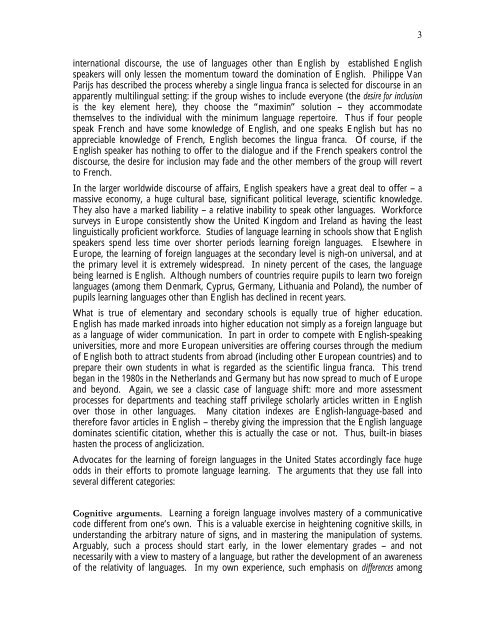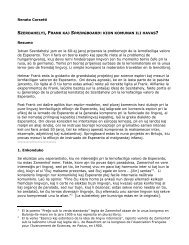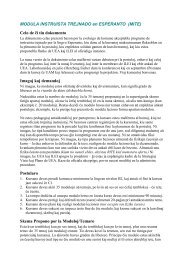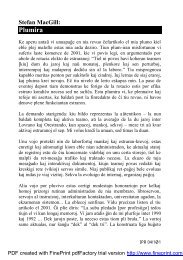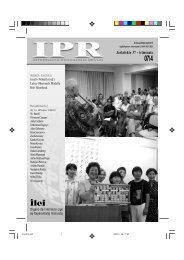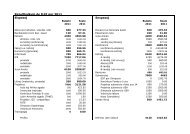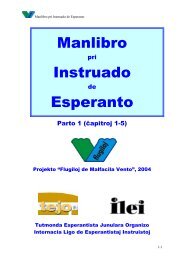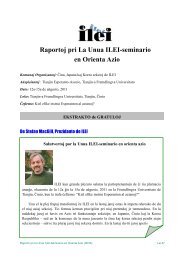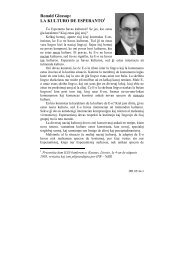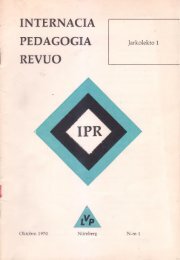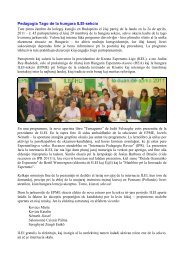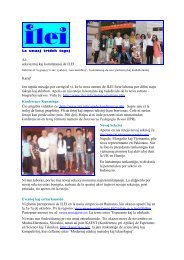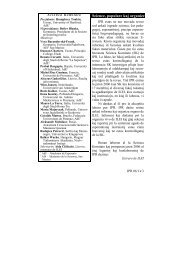Prof. Humphrey Tonkin University of Hartford, USA tonkin ... - ILEI
Prof. Humphrey Tonkin University of Hartford, USA tonkin ... - ILEI
Prof. Humphrey Tonkin University of Hartford, USA tonkin ... - ILEI
You also want an ePaper? Increase the reach of your titles
YUMPU automatically turns print PDFs into web optimized ePapers that Google loves.
3<br />
international discourse, the use <strong>of</strong> languages other than English by established English<br />
speakers will only lessen the momentum toward the domination <strong>of</strong> English. Philippe Van<br />
Parijs has described the process whereby a single lingua franca is selected for discourse in an<br />
apparently multilingual setting: if the group wishes to include everyone (the desire for inclusion<br />
is the key element here), they choose the “maximin” solution – they accommodate<br />
themselves to the individual with the minimum language repertoire. Thus if four people<br />
speak French and have some knowledge <strong>of</strong> English, and one speaks English but has no<br />
appreciable knowledge <strong>of</strong> French, English becomes the lingua franca. Of course, if the<br />
English speaker has nothing to <strong>of</strong>fer to the dialogue and if the French speakers control the<br />
discourse, the desire for inclusion may fade and the other members <strong>of</strong> the group will revert<br />
to French.<br />
In the larger worldwide discourse <strong>of</strong> affairs, English speakers have a great deal to <strong>of</strong>fer – a<br />
massive economy, a huge cultural base, significant political leverage, scientific knowledge.<br />
They also have a marked liability – a relative inability to speak other languages. Workforce<br />
surveys in Europe consistently show the United Kingdom and Ireland as having the least<br />
linguistically pr<strong>of</strong>icient workforce. Studies <strong>of</strong> language learning in schools show that English<br />
speakers spend less time over shorter periods learning foreign languages. Elsewhere in<br />
Europe, the learning <strong>of</strong> foreign languages at the secondary level is nigh-on universal, and at<br />
the primary level it is extremely widespread. In ninety percent <strong>of</strong> the cases, the language<br />
being learned is English. Although numbers <strong>of</strong> countries require pupils to learn two foreign<br />
languages (among them Denmark, Cyprus, Germany, Lithuania and Poland), the number <strong>of</strong><br />
pupils learning languages other than English has declined in recent years.<br />
What is true <strong>of</strong> elementary and secondary schools is equally true <strong>of</strong> higher education.<br />
English has made marked inroads into higher education not simply as a foreign language but<br />
as a language <strong>of</strong> wider communication. In part in order to compete with English-speaking<br />
universities, more and more European universities are <strong>of</strong>fering courses through the medium<br />
<strong>of</strong> English both to attract students from abroad (including other European countries) and to<br />
prepare their own students in what is regarded as the scientific lingua franca. This trend<br />
began in the 1980s in the Netherlands and Germany but has now spread to much <strong>of</strong> Europe<br />
and beyond. Again, we see a classic case <strong>of</strong> language shift: more and more assessment<br />
processes for departments and teaching staff privilege scholarly articles written in English<br />
over those in other languages. Many citation indexes are English-language-based and<br />
therefore favor articles in English – thereby giving the impression that the English language<br />
dominates scientific citation, whether this is actually the case or not. Thus, built-in biases<br />
hasten the process <strong>of</strong> anglicization.<br />
Advocates for the learning <strong>of</strong> foreign languages in the United States accordingly face huge<br />
odds in their efforts to promote language learning. The arguments that they use fall into<br />
several different categories:<br />
Cognitive arguments. Learning a foreign language involves mastery <strong>of</strong> a communicative<br />
code different from one’s own. This is a valuable exercise in heightening cognitive skills, in<br />
understanding the arbitrary nature <strong>of</strong> signs, and in mastering the manipulation <strong>of</strong> systems.<br />
Arguably, such a process should start early, in the lower elementary grades – and not<br />
necessarily with a view to mastery <strong>of</strong> a language, but rather the development <strong>of</strong> an awareness<br />
<strong>of</strong> the relativity <strong>of</strong> languages. In my own experience, such emphasis on differences among


